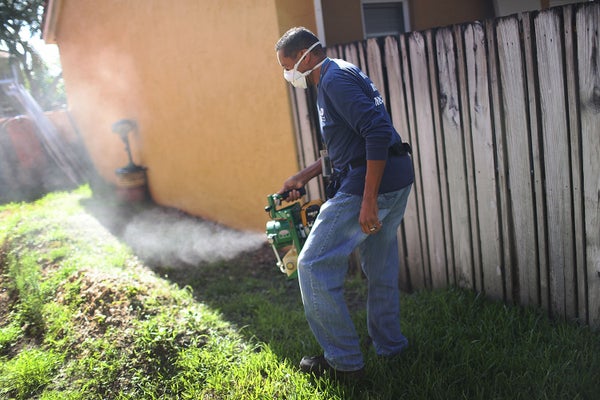The U.S. Centers for Disease Control and Prevention said Monday that pregnant women should avoid travel to a small area of south Florida where mosquitoes have apparently transmitted Zika to residents.
“We advise pregnant women to avoid travel to this area,” CDC Director Tom Frieden says. People who live or work there should try to keep from getting bit by mosquitoes and should apply approved bug sprays, repair broken window screens and use protection to prevent sexual transmission of the virus, Frieden adds.
The decision to issue the travel alert comes after Florida Gov. Rick Scott said Monday that 10 more people in the state have been infected with Zika via mosquito bites, bringing the total number of local cases there—and in the continental U.S.—to 14. Scott had formally announced the four prior cases on Friday. There are undoubtedly more infections, Frieden says, because most cases of Zika are not symptomatic. The investigation to find other infected people is ongoing.
On supporting science journalism
If you're enjoying this article, consider supporting our award-winning journalism by subscribing. By purchasing a subscription you are helping to ensure the future of impactful stories about the discoveries and ideas shaping our world today.
Aggressive mosquito control efforts including daily spraying in southern Florida are not working as well as officials had hoped, Frieden says. One possible reason is that mosquitoes there may have developed insecticide resistance, he says, noting that the CDC plans to test local mosquitoes for resistance but will not have good answers on for several weeks. Aedes aegypti, a mosquito species that spreads Zika, may also simply be difficult to control in this urban area.
The state’s department of health believes that active transmission of the virus is currently limited to a one-square-mile area in Miami–Dade County, just north of Miami’s downtown. Amid this local outbreak the CDC is advising pregnant women to avoid that area. “What we know about Zika is scary,” Frieden says, and babies born to women who contracted Zika during pregnancy may have neurological problems later in life even if they do not appear to have microcephaly at birth.
Total cases in U.S. states: 1672 (14 locally acquired mosquito-borne cases, 1,657 travel related, 1 laboratory acquired); Total cases in U.S. territories: 4,750 (4,729 locally acquired, 21 travel related). Data shown as of July 27 according to the CDC, updated with 14 apparent locally acquired cases total reported by the Florida governor on July August 1.
Graphic by Amanda Montañez
Anyone who was in the affected area beginning on June 15 should talk to their doctors because that is when the first local mosquito transmission may have occurred. Four out of five Zika infections are asymptomatic, which makes it difficult to track the virus. Still, men with symptoms of Zika should wait at least six months before trying to impregnate a partner, according to the CDC. Women considering pregnancy should try to wait eight weeks following travel to a Zika-affected area. People coming back from an area with active Zika transmission should also wear mosquito repellent for the following three weeks to help protect family and community members, Frieden says.
The latest cases of local transmission were uncovered via door-to-door community surveys by state health workers. Six of the infected individuals were asymptomatic for Zika, meaning they had no typical symptoms of the disease such as fever, rash or joint aches. Of the 14 identified individuals, two are women and 12 are men.
So far the state’s health department has conducted Zika testing on more than 2,300 people in the state. In recent weeks officials in Miami–Dade and Broward counties tested 200 individuals who lived or worked near the people whom public health authorities believed might have acquired Zika through mosquito-borne transmission.
Florida on Monday asked the CDC for emergency assistance to help respond to the outbreak, and this week the agency is sending six additional experts in laboratory science, communications and the Zika virus to join two other CDC staff members already on the ground.
The agency’s new travel alert for pregnant women came after the CDC reviewed data over the weekend suggesting that mosquito control was not as effective as it hoped and that Florida had additional cases of locally transmitted Zika beyond what they knew about on Friday. The CDC says it may alter the size of the travel warning area as further data becomes available. “We will continue to look at this data every single day, including with additional testing,” Frieden says.
